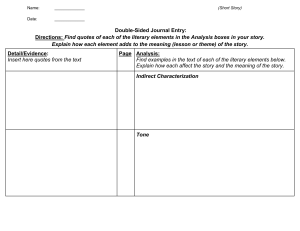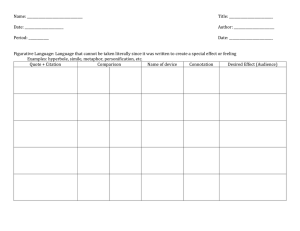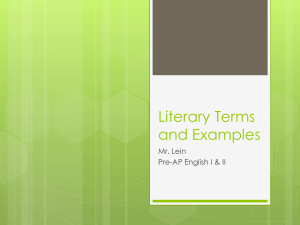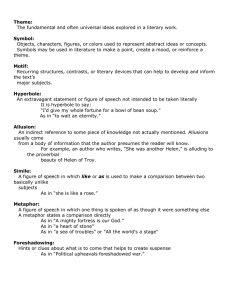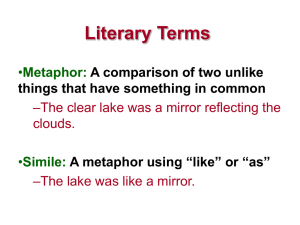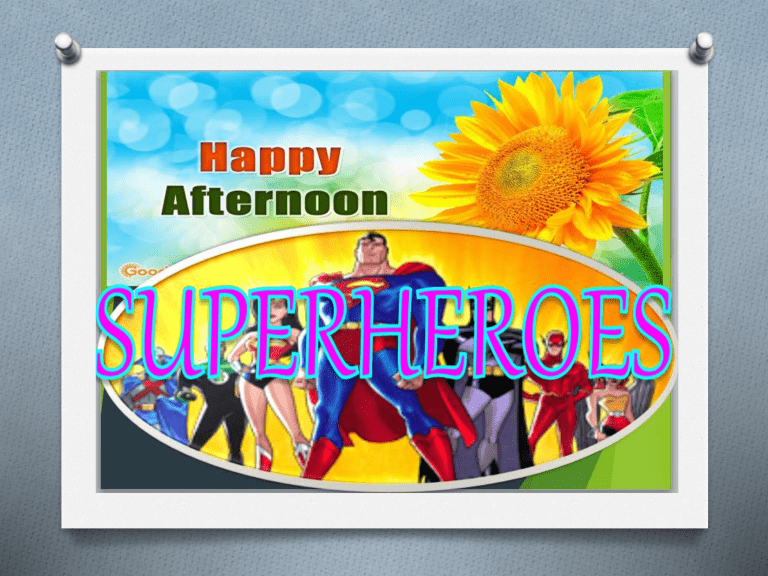
FIGURATIVE LANGUAGE & LITERARY DEVICES POETRY! O Poetry (from the Greek "ποίησις", poiesis, a "making") is a form of literary art in which language is used for its aesthetic and evocative qualities in addition to, or in lieu of, its apparent meaning. Poetry may be written independently, as discrete poems, or may occur in conjunction with other arts, as in poetic drama, hymns or lyrics. WHAT IS FIGURATIVE LANGUAGE? O Figurative language presents ordinary things in fresh ways, communicating ideas that go beyond words’ ordinary meanings. O HERE ARE SOME EXAMPLES… FIGURATIVE LANGUAGE: IT’S LIKE A SIMILE – a comparison of two unlike things using the words like or as. Examples of simile: O “Life is like a box of chocolates.” O “The girl is as beautiful as a rose.” FIGURATIVE LANGUAGE: IT IS A METAPHOR – a comparison of two unlike things without using the words like or as. Examples of metaphor: O “My father is a tall, sturdy oak.” O “The hotel is a diamond in the sky.” FIGURATIVE LANGUAGE: PERSONIFICATION – the giving of human qualities to an animal, object, or idea. Examples of personification: O “Hunger sat shivering on the road.” O “The flowers danced on the lawn.” O “SpongeBob SquarePants” and “Smokey the Bear” are personified characters. FIGURATIVE LANGUAGE: HYPERBOLE - an exaggerated statement used to make a point. Examples of hyperbole: O “An apple a day keeps the doctor away.” O “I could sleep for a year.” O “This book weighs a ton.” Symbolism Symbolism combines a lot of the ideas presented in metaphor and imagery. Essentially, a symbol is the use of an object to represent a concept—it’s kind of like a metaphor, except more concise! Symbols are everywhere in the English language, and we often use these common literary devices in speech and design without realizing it. The following are very common examples of symbolism: A few very commonly used symbols include: “Peace” represented by a white dove “Love” represented by a red rose “Conformity” represented by sheep “Idea” represented by a light bulb switching on IRONY is when a statement is used to express an opposite meaning that the one literally expressed by it. A fire station burns down. This is unexpected because one would assume the fire chief would keep his own building safe. A marriage counselor files for divorce. This is ironic because the expectation is that a professional who coaches couples through rough patches would herself have a strong marriage. The police station gets robbed. Again, the expectation is that professional crime fighters would be able to help themselves; in this case, by securing their own station. Oxymoron An oxymoron is a figure of speech which contains words that seem contradictory to one another. This incongruity can be accidental or deliberate, as in cases of humor. I distinctly remember forgetting that. - Clara Barton Always be sincere, even when you don’t mean it. Irene Peter We must believe in free will. We have no choice. Isaac B. Singer Juxtaposition -occurs when two things are placed side by side for comparison, often to highlight the contrast between the elements. The simplest example would be the yin-yang symbol. There, you have a circle where the black and white elements stand in contrast to one another - positive and negative - but also complement each other. In the juxtaposition examples below, we'll explore everyday scenarios, literary contrasts, and juxtaposition in art.“Peace” represented by a white dove Juxtaposition Old with the new: If you've ever visited Rome, you might have noticed that the ancient Colosseum still stands tall and proud. But, not too far away, there are graffiti-ridden buildings. The two stand in total contrast to one another. Happily or unhappily married: Have you ever gone out to eat and noticed different couples at their tables? Perhaps one couple is sitting side by side in a booth, talking quietly and closely. Beside them might be a couple sitting across from one another, with sour looks on their faces and cell phones in hand. Married life isn't always perfect. Allusion If you haven’t noticed, literary devices are often just fancy words for simple concepts. A metaphor is literally a comparison and hyperbole is just an overexaggeration. In this same style, allusion is just a fancy word for a literary reference; when a writer alludes to something, they are either directly or indirectly referring to another, commonly-known piece of art or literature. The most frequently-alluded to work is probably the Bible. Many colloquial phrases and ideas stem from it, since many themes and images from the Bible present themselves in popular works and Western culture. Any of the following ideas, for example, are Biblical allusions: Allusion Referring to a kind stranger as a Good Samaritan Describing an ideal place as Edenic, or the Garden of Eden Saying someone “turned the other cheek” when they were passive in the face of adversity When something is described as lasting “40 days and 40 nights,” in reference to the flood of Noah’s Ark“Peace” represented by a white dove Euphemism A euphemism is a polite expression used in place of words or phrases that might otherwise be considered harsh or unpleasant. passed away instead of died letting someone go instead of firing an employee economical instead of cheap well-fed instead of overweight golden years instead of old age\ unique instead of odd or weird experienced instead of old Epigraph An epigraph can serve a number of different purposes. Whether a literary work is fiction or nonfiction, epigraphs serve to clue readers in to some element of the work they are about to read. Sometimes authors use epigraphic quotes to set up larger themes they will explore later in their books. Other epigraph set up expository information that will help the reader understand the work. 4 Examples of Epigraphs in Literature There are many different epigraph examples in literature. Some notable examples include: Frankenstein by Mary Shelley: “Did I request thee, Maker, from my clay / To mound me Man, did I solicit thee / From darkness to promote me?” — Paradise Lost To Kill a Mockingbird by Harper Lee: “Lawyers, I suppose, were children once.” —Charles Lamb The Godfather by Mario Puzo: “Behind every great fortune, there is a crime.” —Balzac The Sun Also Rises by Ernest Hemingway: “You are all a lost generation.” —Gertrude Stein ALLITERATION is a series of words or phrase that all start with the same sound. Ex. “Peter Piper picked a peck of pickled peppers.” Examples of Alliteration in Sentences The boy was as busy as a bee. The lazy lion licked his lips. She sells seashells by the seashore. “Whisper words of wisdom, let it be.” “They paved paradise and put up a parking lot.”
